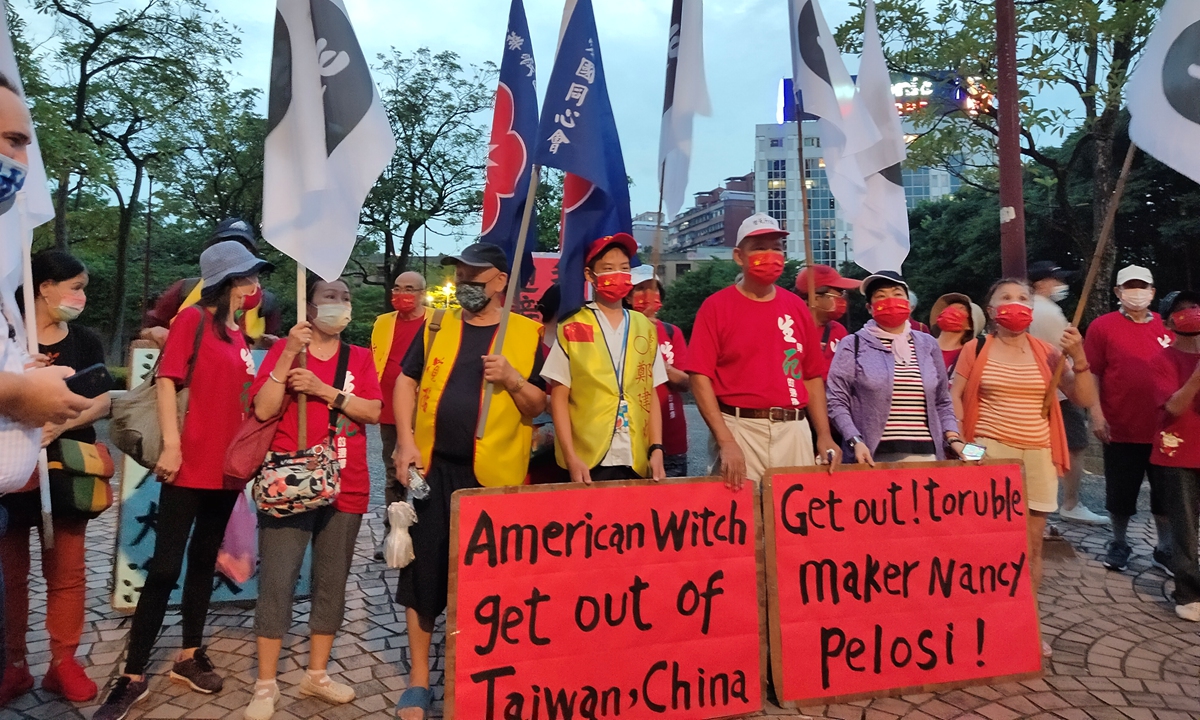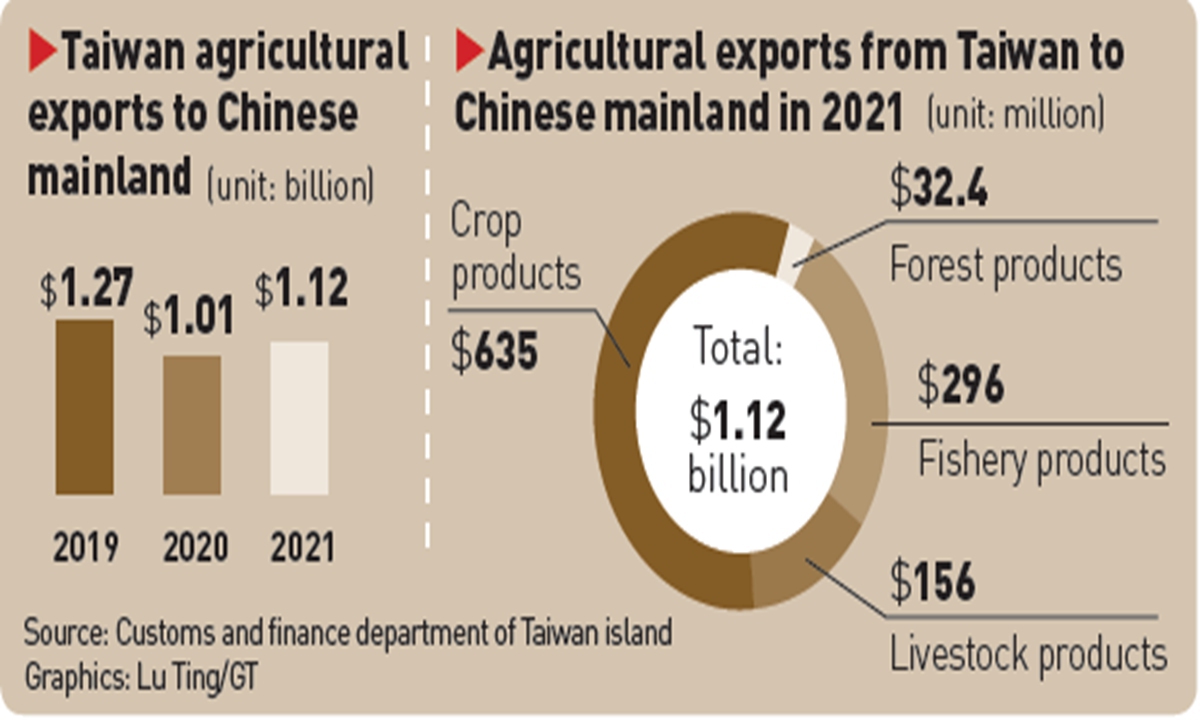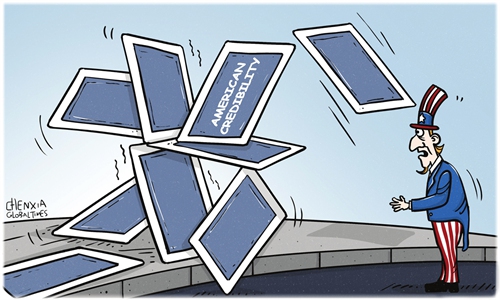
Civic groups, politicians, and business and industry representatives on the island of Taiwan on Tuesday protested against US House Speaker Nancy Pelosi's potential visit. Photo: Fan Lingzhi/Global Times
The Chinese mainland has suspended imports of several agricultural products from the island of Taiwan amid simmering tensions over US House Speaker Nancy Pelosi's visit to Taiwan, which is seen as a serious violation of the one-China principle and sparked military exercises around the island by the Chinese People's Liberation Army.
Experts said the secessionist Tsai Ing-wen government, which received and courted Pelosi and thus aroused political instability in the Taiwan Straits, should be held responsible for the sanctions. Taiwan businesspeople who are patriotic and willing to build the motherland and realize the great rejuvenation of the Chinese nation are always welcome to develop in the mainland market, experts said.
Starting Wednesday, Chinese mainland customs authorities suspended the entry of citrus fruits including grapefruits, lemons and oranges, as well as two types of fish, chilled largehead hairtail and frozen horse mackerel from the Taiwan region in accordance with the mainland's regulations and food safety requirements.
Those goods have been repeatedly detected to carry pests or excessive chemicals, said the customs authority.
All customs branches will stop accepting goods declarations for these agricultural and aquatic products and notify relevant companies in their jurisdictions in a timely manner, the General Administration of Customs (GAC) said in a statement on Wednesday.
"The ban on an increasing number of Taiwan fruits and seafood may drag down Taiwan's GDP by 0.1 percentage point," Dai Shugeng, a professor of economics at Xiamen University, told the Global Times. He calculated that Taiwan's GDP will plunge into contraction if the mainland bans all kinds of products, as the mainland's contribution to the region's GDP is 21.72 percent.
In order to help create jobs and boost economic growth in the Taiwan region, the mainland has come up with a series of favorable policies in expanding imports from Taiwan since the reform and opening-up, and as a result, Taiwan relies heavily on the mainland market for its agricultural products, Dai said.
According to the Taiwan Council of Agriculture, the mainland has been the largest export market for Taiwan's agricultural products since 2016. In 2021, the island exported $1.1 billion worth of agriculture products to the mainland, up 10.15 percent from the previous year, data from the island's agriculture department showed.
"The mainland's sanctions on Taiwan will further weigh on the economy that is facing downward pressure, whereas the Tsai authorities will eventually force Taiwan people to pay for her provocative moves," Wang Jianmin, a senior research fellow with the Institute of Taiwan Economics of the Central University of Finance and Economics, told the Global Times on Wednesday.
The mainland's import ban would have a tangible impact on local fisheries and processing plants in Taiwan, as seafood products are generally sold at a higher price due to scale demand in the large mainland market, Kuo Chien-hsien, director of the Taiwan Tilapia Alliance, told the Global Times.
A farmer who plants sweet oranges in Yunlin County of Taiwan told the Global Times that the ban would lead to a plunge in orange prices if they cannot sell them to the mainland. "Taiwan people and mainland people are one family. Hope the Tsai government could come up with measures to help we farmers," he said.
"The sanctions on DPP are just beginning. More sanctions on Taiwan are expected to follow," Wang said, noting that the central government may come up with more severe punishments, for example, banning Taiwan's industrial and high-tech products.
Exports of natural sand from the mainland to Taiwan will also be suspended, which is seen as another powerful weapon to add economic and political pressure on the Tsai government over secessionist acts.
It is worth noting that this is the second time the mainland has halted exports of the raw material - widely used in the construction sector - to the region.

Graphic:GT
Due to environmental protection reasons, the mainland imposed a ban in 2007. However, companies and authorities in Taiwan appealed to the mainland to resume exports of natural sand, as the region's construction sector as well as the whole economy was impacted due to short supply of the raw material.Considering economic development and the need to support livelihoods, the central government resumed natural sand exports to Taiwan in March 2008, supplying more than 90 percent of the region's total natural sand imports, according to statements on the website of Ministry of Commerce.
Wang said the ban on the important material used in the real estate sector may further affect housing prices in Taiwan and thus further lead to inflation.
Recently, Singapore-based DBS Bank cut its estimate of the Taiwan region's GDP growth rate to 3.4 percent for 2022 from 3.8 percent, citing the impact of rising inflation and monetary policy tightening by the US Federal Reserve, Taiwan-based Central News Agency reported.
Zhang Wensheng, deputy dean of the Taiwan Research Institute at Xiamen University, told the Global Times that the Taiwan authorities are responsible for the pain caused to common Taiwan people, urging the Tsai government to recognize the 1992 Consensus and conduct dialogues to appropriately deal with differences.
In the meantime, mainland authorities announced Wednesday that a number of diehard "Taiwan secessionist" individuals, two funds, and multiple companies related to secessionist activities will be punished in accordance with the law.
The authorities will take punitive measures against the "Taiwan Foundation for Democracy" (TFD) and the "International Cooperation and Development Fund" (ICDF), two organizations that have close ties with diehard secessionists, said Ma Xiaoguang, a spokesperson of the Taiwan Affairs Office of the State Council.
Enterprises that have donated to the two funds, such as Speedtech Energy, Hyweb Technology, Skyla Corporation, Skyeyes GPS Technology, are to be prohibited from conducting any transactions or cooperation with mainland organizations, enterprises and individuals. The persons responsible for these enterprises are banned from entering the mainland.

